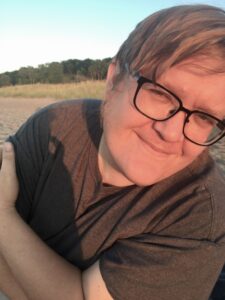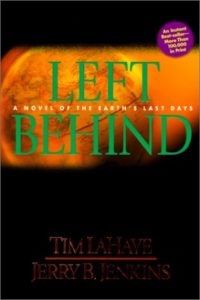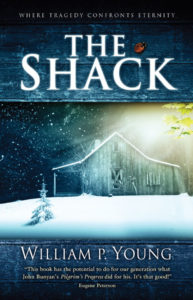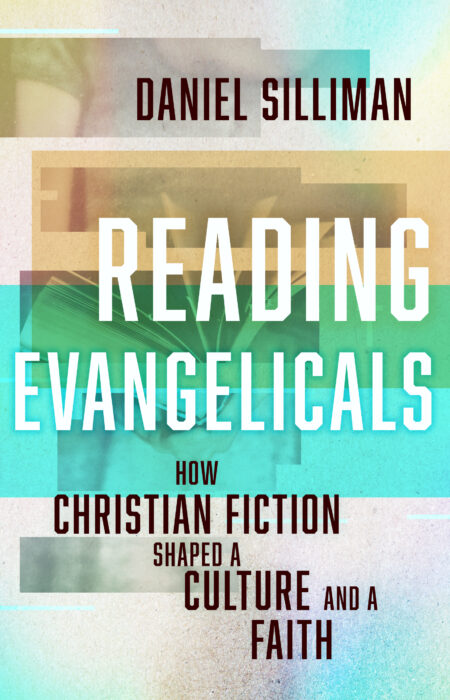84. How Did Bestselling Christian Novels Build Evangelical Culture? | Reading Evangelicals with Daniel Silliman
Podcast: Play in new window | Download (Duration: 1:52:08 — 104.0MB) | Embed
Episode sponsors
“Christian fiction is so cringe and cheesy, so let’s ignore it.” Some critics talk like this. But today’s guest challenges this line: Daniel Silliman, Christianity Today news editor and author of the new nonfiction book Reading Evangelicals. He surveys five bestselling titles, including Frank Peretti’s This Present Darkness, Tim LaHaye’s and Jerry B. Jenkins’s Left Behind, and Wm. Paul Young’s The Shack. Why did Christian readers love these books? How did these novels define their fans’ imaginations and help build our evangelical communities?
Concession stand
- Here, we can define “Christian fiction” as “a Christian wrote the fiction.”
- Yet we also speak about fiction by Christians, for Christians, a subculture.
- We don’t condemn this subculture. In fact, we think the idea is necessary.
- Christians often formed this subculture in response to being marginalized.
- See The Christian Publishing Show, Thomas Umstattd Jr. with Leslie Stobbe.
- Today’s guest wants to understand the definitions/culture of evangelicals.
- Even if you are one, it’s good to see ourselves academically from outside.
- We also need to confront how political cultures replace fandom cultures.
- Stephen wrote How Political Punditry Has Taken Over Christian Popular Subcultures.
- This isn’t a class. Or fiction book club. Instead, we’re asking questions after class!
 Introducing Daniel Silliman
Introducing Daniel Silliman
Daniel Silliman is a journalist and a historian. He is the news editor for _Christianity Today_, the author of a history of bestselling evangelical fiction, and teaches humanities at Milligan University.
Daniel spent several years as a crime reporter outside Atlanta before pursuing higher education in Germany, earning a MA from Tübingen University and a doctoral degree from Heidelberg University. He was a Teaching Fellow at the University of Notre Dame from 2016-2017 and a Lilly Postdoctoral Fellow at Valparaiso University from 2017-19. He has reported and edited news coverage for CT since 2019.
- DanielSilliman.org
- @DanielSilliman on Twitter
- Explore more of Reading Evangelicals on Amazon
- “New Book ‘Reading Evangelicals’ Will Focus on Famous Christian Fiction,” Lorehaven news, Jan. 27, 2021
- “What’s True About Christian Fiction,” Daniel Silliman, Christianity Today cover story (members only), Sept. 20, 2021

Exploring Reading Evangelicals
1. How did you discover biblical truth and Christian-made fiction?
2. What questions do you hope to answer by exploring top Christian fiction?
- From chapter 2 (page 78), about Frank Peretti’s This Present Darkness:

… Conspiracies depend on keeping secret meetings from becoming public.
The novel is not just staging cultural conflicts, it is inviting readers to see how the staging itself is part of the cultural conflict. The first political fight is always about the rules of political fights. This Present Darkness returns again and again to the conflict of what is allowed in meetings, and who is allowed in meetings. The first pragmatic principle of the public sphere, its publicness, is shown to be suspect.
- From chapter 3 (page 98), about Tim LaHaye’s and Jerry Jenkins’s Left Behind:
Apocalypse-minded Christians have been motivated by their expectations of rapture, the tribulation, and the antichrist to pay close attention to world events and take an active interest in American politics, both foreign and domestic. There is a myth that fundamentalists disengaged from cultural conflicts because of their theology.
3. How do you think Christian-made fiction could (or should) grow from here?
Next on Fantastical Truth
Dragons. Light. Raiders. Lightraiders! One shepherd boy with four companions, plus a talking silver wolf, begin their quest to restore the Lightraider Order, destroy a portal, and stop an invasion. So begins novelist James R. Hannibal’s Lightraider Academy series book 1, Wolf Soldier. It’s releasing Tuesday, Oct. 26, and we’re hosting James again to explore this new young-adult fantasy.





































But DO Charismatics count as Evangelicals? Do other evangelicals think so, too?
My analysis: Subcultural pop fiction is about the only non-political way to achieve some form of theological coherence within the low-church end of Protestantism. Lots easier to update than Elizabethan English prayer books, too.
PS All you dweebs who are trying to hobby-farm your way into self-fulfillment: I mean, I get it. I should know better than to romanticize farming, but it still has a sentimental pull on my heartstrings, but fortunately most of the cool parts you can still do in your suburban backyard or gardenshare plot. There are heaploads of books about sub/urban farming. Tho canning still sucks. (Pro-tip: Do your boiling on a hot plate OUTSIDE. Your a/c will thank you.) Butchering sucks. Chickens are cannibals.
Any perks of rural life IMO are pretty much outweighed by the horrible inconvenience and emotionally crippling isolation.
I’m not charismatic. And yes, they do count. Many are not just evangelicals but biblical Christians.
Extra Thought: CS Lewis reintroduced all this (Neo) Platonism (or at least insofar as the real being a reflection of the Ideal), but besides from some massaged verses from Thessalonians or whatever, there’s not much biblical about the idea. But then we’ve been scavenging from Greek philosophies for about as long as Christianity was invented, like Stoicism.
But my monkey wrench in the thought experiment is that the Ideal is a social construct, like money or social class. So do you still want to retain the Neo Platonism and why?